When you are raising animals, it is always stressful and frightening when they get sick. Here are some common ailments that can strike backyard chickens, and tips for prevention and care.
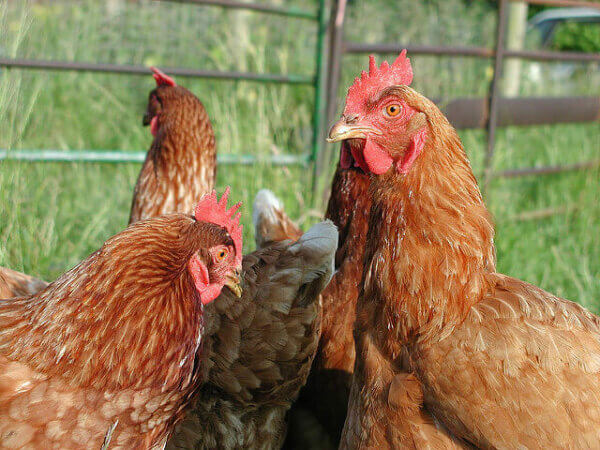
Not all chicken deaths are caused by disease. Check out our article on chicken lifespans to find out more about how long a chicken lives and the threats they face from predation.
The Importance Of Biosecurity
Biosecurity means preventing diseases and pathogens from entering your chicken flock from the outside.
The most important step you can take in keeping your chickens healthy and happy is to limit their exposure to pathogens and parasites in the first place. Prevention is always the best (and cheapest!) cure.
When you buy new chickens, especially full grown birds, always quarantine them away from the rest of your flock for 10-14 days. This not only allows a period of social and territorial adjustment to a new home, but also allows time for disease symptoms to emerge in the new birds before you mix your flock. This is a great practice with any new animals you introduce to your home. The steps to biosecurity are discussed in the video below.
Dangers From Wild Birds
Wild migratory birds can also introduce pathogens into your flock, but you can limit their contact with your chickens by not keeping a bird feeder or bird bath in your yard.
If you live near a body of water that attracts geese and other migrating fowl, fence your chickens away from the water’s edge. Pathogen exchange usually happens through feces, so keep your chickens away from those areas even when there are no wild birds present.
Dangers From Mammals (Including Humans)
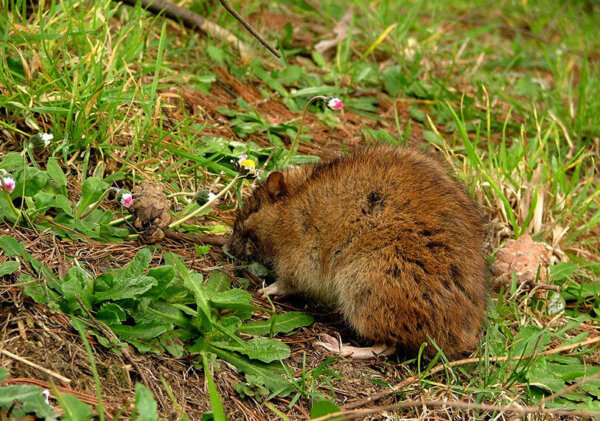
Rodents and their droppings can also be disease vectors and potential predators. Discourage rodents by only feeding your chickens as much as they will eat in a day so that there is not extra food in their coop on a regular basis. Change their bedding frequently and keep an eye out for rat droppings.
Something else to keep in mind is that you have the potential to transmit diseases through your own clothes and tools. When you visit a farm with livestock, or even someone else’s chicken coop, wear a different pair of boots or plan to wash yours before working with your chickens. As always, wash your hands after handling any animal, especially if you think one might be sick.
Internal Parasites: Worms
A common cause of lethargy, weight loss, reduced egg production, and diarrhea in chickens is parasitic worms. This includes both roundworms and tapeworms.
Roundworms are spread through contact with infected feces, so cleanliness and separation from wild animals and unfamiliar chickens are the best preventative measures. Tapeworms, on the other hand, are transmitted by host creatures, including slugs and insects.
Danger From Pets

Domestic cats and dogs carry some of the same varieties of worms that live in chickens, and can transmit these parasites to your home. Always monitor your house pets for signs of worms and treat any infestations. If you suspect worms, either in your chickens or household pets, it doesn’t hurt to go ahead and treat them. If you want a definitive diagnosis, seek out any small-animal veterinarian.
Treating Worms
If you suspect worms, quarantine the affected chickens, and thoroughly clean the coop. If possible, rotate your chickens to a new area. Feed your chickens oral dewormers, keep their living space clean, and retreat every three weeks to break the worms’ reproductive cycles since they can live both inside and outside a bird’s body.
Most farm and garden stores carry at least one brand of dewormer suitable for poultry. Ask the staff at the store for advice on what they recommend.
Diatomaceous earth (DE) as a feed additive has been shown to be moderately effective in controlling internal parasites, especially as a preventative measure. Some people try to use garlic and onion as dewormers, but there is evidence that alliums have no effect in worm control.
Alliums are worth trying as preventative measures if your flock is at risk— if you have large numbers of migratory birds or feral cats and dogs in your area. However, keep in mind that feeding chickens alliums can make their eggs taste “garlicy.”
External Parasites—Lice and Mites
Like many animals, chickens can play host to parasites that live on their skin and in their feathers, such as poultry lice and various mites. External parasites can cause lesions and scabbing, lethargy, and reduced egg production.
Catching parasite infestations early is essential since they grow and develop quickly. Once a population of parasites is well established, they are much harder to eradicate.
Treating Parasites
Before any treatment begins, make sure to quarantine affected chickens away from the rest of the flock. A number of pesticide products are designed to treat parasitic infestations, both on the chicken’s body and in their coop, including organically-certified pesticides like pyrethrum.
If you want to avoid chemicals of all kind, trying using DE to treat parasites. The downside of DE is that it needs to be applied both heavily and repeatedly, externally. Always wear respiratory protection when applying pesticides of any kind, including DE.
Of course, thoroughly cleaning their coop is necessary, and if possible, rotating them to a new part of your yard is best. Chickens will need to be treated regularly for several weeks as eggs continue to hatch on their bodies.
Infectious Diseases
Infectious diseases are caused by either viruses or bacteria that can be introduced to your chickens by the environment, other chickens, migratory birds, insects, parasites, or rodents. Chicken diseases mainly fall into three categories—respiratory, digestive, and reproductive.
Signs of respiratory illness may include sneezing, wheezing, heavy breathing, and frothing or foaming at the eyes and beak. Respiratory illnesses have both viral and bacterial causes. One owner has captured their chicken with sinusitis in the video below.
Viral diseases cannot be cured, they are only managed with quarantine, clean surroundings, plenty of water, and dry, warm shelter. Chickens are particularly susceptible to respiratory diseases in the winter, so be sure your chicken coop is not drafty or damp, and give your chickens a heat lamp for the cold months.
Digestive Problems
Chickens can contract digestive complications, not all of which are contagious. The most common problem is diarrhea, which can cause fatal dehydration, especially in young chicks. Like respiratory illnesses, diarrhea can be caused by both viruses and bacteria, and not all the causes are treatable.
It’s important to support your chicken’s body with electrolytes during bouts of diarrhea. You can buy poultry electrolytes over the counter at any farm and garden store, and the store owner can advise you about use. Poultry probiotics can also be used to treat bacterial diarrhea.
Other digestive problems include:
- Oral sores. These are treatable by a vet.
- Sour crop, a yeast infection in the crop. Treatable with prescription anti-fungal medication and probiotics.
- Impacted, or blocked crop. Caused by a muscle paralysis or ingesting a foreign object which blocks the crop.
Using Antibiotics
Antibiotics are not effective against viral illness, but viruses can weaken a chicken’s immune system and make them vulnerable to secondary bacterial infections. E. coli is a common culprit of these infections, and it can quickly cause fatal blood poisoning.
Secondary infections and septicemia are treatable with antibiotics. Talk to a veterinarian to be sure you are treating your birds the best way possible. Below is a video on how to give your chicken antibiotics from The HenCam.
Diagnosing Unknown Killers
Typically by the time you know something is seriously wrong, chances are a chicken will already be dead or too sick to treat. It can be hard, even impossible, to know for sure what pathogen killed your bird, especially if you haven’t seen clear symptoms developing. If you don’t know what kind of illness your chicken has or how to treat it, you can try to find a place that will perform a necropsy, or a post-mortem diagnosis, on the animal.
Many university extensions offer this service affordably and if they do not, they will likely know where to refer you. A necropsy can tell you what your chicken died of, giving you the knowledge needed to treat or vaccinate the other birds in your flock to prevent more losses.
Even if one chicken succumbs to an illness, it doesn’t necessarily mean that your whole flock will die of an epidemic. Chickens can die of heatstroke, dehydration, cold, age, organ failure, and other non-contagious health problems, not to mention predation.
Keep a close eye on your flock after the death of a bird, and give them fresh water and bedding. If more than one hen dies in a short timespan, those deaths are more likely to be caused by a disease.
Clean Coop, Healthy Chickens
Don’t worry yourself too much about illness ravaging your backyard chicken flock. Basic care can keep birds healthy and minimize the risk of illness. Every coop and chicken tractor are designed differently, so keeping a hygienic environment for your birds may not look the same as your neighbor’s cleaning routine.
Cleanliness is always important, but it is doubly so when you have a sick chicken. Move your chickens somewhere temporarily while you clean their coop after quarantining any chickens with symptoms.
Keep in mind that nest boxes and under roosts accumulate feces the most rapidly. Shovel out any bedding like straw or sawdust that you use in your coop and boxes, and scrub or hose down surfaces with soapy water.
If you are worried about pathogens, you can sterilize with vinegar or bleach. Allow the coop to air dry before adding clean bedding. Check out this video for cleaning your coop as an urban farmer.
Rotating Chicken Habitats
One of the best practices for maintaining chicken health is to rotate them onto fresh ground if you have a moveable coop or shelter. This gets them away from a build-up of their own feces which helps to both lower their risk of internal parasites and gives them new ground to forage in.
Having access to more lush and diverse foraging ground increases chickens’ nutrient intake and boosts their immune systems. And of course, sunlight and fresh air are some of the best health supports available. However, even with the best care and biosecurity, there are some common contagious health problems that can trouble chickens. If you have a mobile chicken house or chicken tractor, clean the structure before moving it onto new ground, to minimize the transfer of disease.
Focus On The Basics
Make sure your birds have clean water and bedding, lots of fresh air, shelter from the rain and cold, and shade in the heat. And of course, to keep yourself and your animals healthy, always wash your hands after handling chickens. Even healthy birds can transmit diseases like salmonella, especially to children. Ninety percent of the time, keeping yourself and your pets healthy is just a matter of preventative care and good biosecurity.
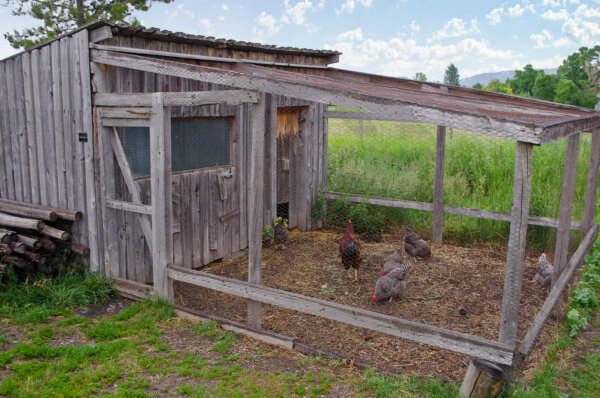

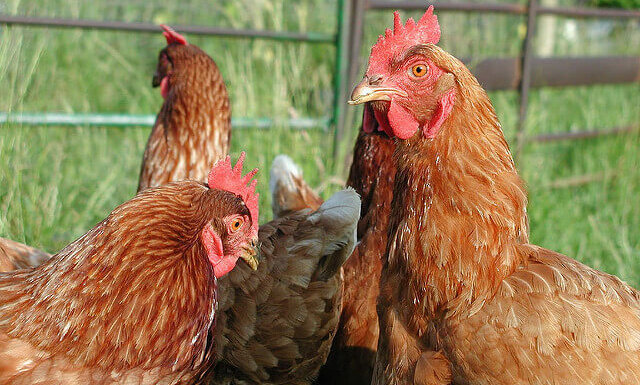




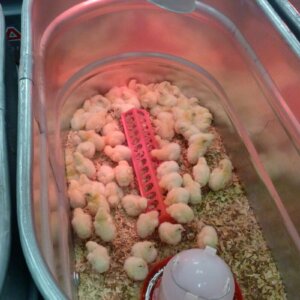




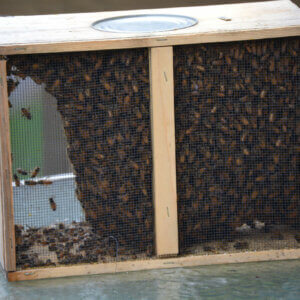


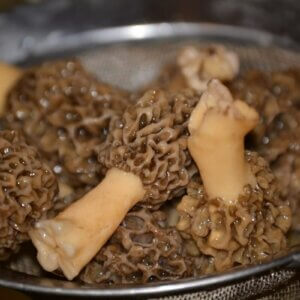






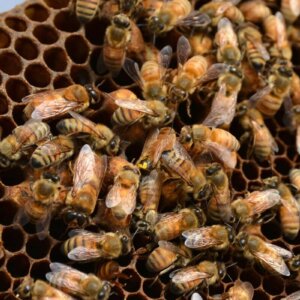











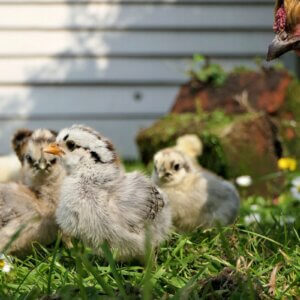





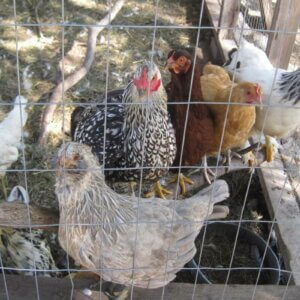
Leave a Reply